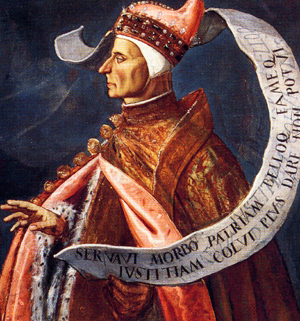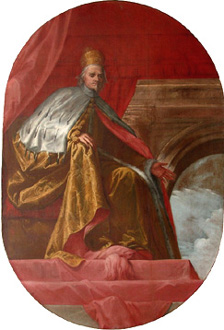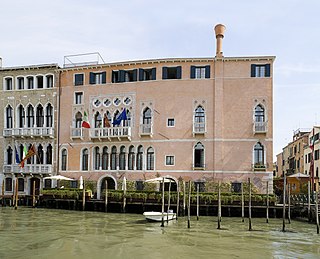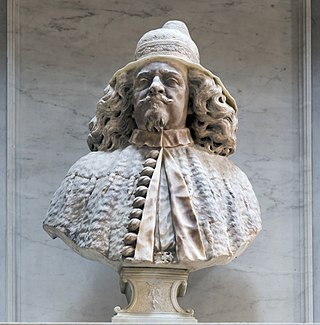
Francesco Foscari was the 65th Doge of the Republic of Venice from 1423 to 1457. His reign, the longest of all Doges in Venetian history, lasted 34 years, 6 months and 8 days, and coincided with the inception of the Italian Renaissance.

The Patriarch of Venice is the ordinary bishop of the Archdiocese of Venice. The bishop is one of only four patriarchs in the Latin Church of the Catholic Church. The other three are the Patriarch of Lisbon, the Patriarch of the East Indies and the Latin Patriarch of Jerusalem. Presently, the only advantage of this purely formal title is the bishop's place of honor in papal processions. In the case of Venice, an additional privilege allows the patriarch, even if he is not a cardinal, the use of the colour red in non-liturgical vestments. In that case, the red biretta is topped by a tuft, as is the custom with other bishops who are not cardinals.

The naval Battle of Zonchio took place on four separate days: 12, 20, 22, and 25 August 1499. It was a part of the Ottoman–Venetian War of 1499–1503.

Nicolò Sagredo was the 105th Doge of Venice, reigning from 6 February 1675 until his death less than two years later. Little of note occurred during his reign as Venice was still recovering from the Cretan War (1645–1669), which had ended in the reign of his predecessor.

Marco Barbarigo was the 73rd Doge of Venice from 1485 until 1486. His nomination took place on a new staircase in the courtyard of the Doge's Palace, on an axis with the Campanile of St. Mark and the Porta della Carta.

A doge was an elected lord and head of state in several Italian city-states, notably Venice and Genoa, during the medieval and Renaissance periods. Such states are referred to as "crowned republics".

Andrea Celesti (1637–1712) was an Italian painter of the Baroque period, working in Venice. His style gravitated over the years from a turgid and academic weightiness to a lighter, looser brushstroke.

San Francesco della Vigna is a Roman Catholic church in the Sestiere of Castello in Venice, northern Italy.

Leandro Bassano, also called Leandro dal Ponte, was an Italian artist from Bassano del Grappa who was awarded a knighthood by the Doge of Venice. He was the younger brother of artist Francesco Bassano the Younger and third son of artist Jacopo Bassano. Their father took his surname from their town of Bassano del Grappa, and trained his sons as painters.

Giovanni Francesco Sagredo was a Venetian mathematician and close friend of Galileo. He was also a friend and correspondent of English scientist William Gilbert. He is remembered today mainly because he appears as one of the figures in Galileo's controversial work the Dialogue Concerning the Two Chief World Systems (1632).

Francesco Contarini was the 95th Doge of Venice, reigning from 8 September 1623 until his death fourteen months later.

Francesco Cornaro or Francesco Corner was the 101st Doge of Venice. His reign as Doge was the shortest of any Doge. He was elected on 17 May 1656 and died only a few weeks later, on 5 June 1656.

Alvise Contarini was the 106th Doge of Venice, reigning from his election on 26 August 1676 until his death seven and a half years later. He was the eighth and final member of the House of Contarini to serve as Doge of Venice.
This article presents a detailed timeline of the history of the Republic of Venice from its legendary foundation to its collapse under the efforts of Napoleon.
Sagredo is a surname. It may refer to:

The Ca' Sagredo is a 14th-century Byzantine-Gothic style palace located on the corner of the Strada Nuova and Campo Santa Sofia, in the sestiere of Cannaregio in central Venice, Italy. It now faces the Grand Canal (Venice), and across the campo from the Ca' Foscari. On the left side there is the Palazzo Giustinian Pesaro.

Antonio Gai was an Italian sculptor, active in his native Venice and Veneto during the late-Baroque period.

The Provveditore Generale da Mar was the most senior peacetime office in the Venetian navy and in charge of governing the Venetian overseas empire.

Safavid–Venetian relations were the relations between Safavid Iran and the Republic of Venice.

















